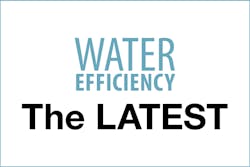The nation’s drinking water and wastewater systems require urgent and renewed attention. While the nation’s spectrum of infrastructure challenges merits attention, water is essential to life and requires an extraordinarily cooperative response from both the public and private water sectors to replace existing water infrastructure.
The American Society of Civil Engineers’ (ASCE) 2017 Report Card for America’s Infrastructure gave the country’s water and wastewater systems grades of D and D+ respectively. The findings released by the ASCE affirm the urgent need to repair or replace aging water infrastructure to ensure resiliency for health, safety, and robust local economies.
The Metropolitan Water Reclamation District of Greater Chicago is seeking a visionary Executive Director. The District is an award-winning wastewater agency which has been a leader in protecting the Chicago area water environment for over a 120 years. For information and to apply, click here or contact [email protected].
The District is an Equal Opportunity Employer.
From Flint, Michigan to Los Angeles, California and hundreds, possibly thousands of other communities, the cascading effects of the nation’s crumbling water infrastructure is a clear and present threat to Americans’ wellbeing and quality of life. The continued deterioration of the nation’s water systems could lead to increased water service disruptions, more barriers to emergency response, impacts to other public infrastructure, as well as threats to public health for many Americans.
While the nation’s water infrastructure faces significant challenges, the National Association of Water Companies’ (NAWC) member utilities work diligently with their respective state economic regulators to ensure rates for water service support the investment needed to meet all water quality and environmental standards and provide the service that customers expect and deserve. NAWC’s members look forward to helping more communities across the country to “improve their grades.”
Services provided by water utilities are more than twice as capital-intensive as electricity and telecommunication utilities, and nearly three times as capital-intensive as natural gas. The EPA forecasts capital needs of $600 billion over the next 20 years to upgrade pipes, treatment facilities, storage facilities, and other assets for drinking and wastewater systems. Many communities faced with the financial challenges of paying for needed water infrastructure improvements can access federal programs. Because these federal programs can sometimes be limited in scope, having access to private capital for public water infrastructure projects is also a viable option.
Private operators can help communities. Private water companies have a stellar drinking water quality compliance record. The operational disciplines of the private water sector have provided communities with the necessary economies of scale, efficiencies, expertise, and application of new technologies to help overcome water challenges.
Private water companies have served this nation for more than 200 years and have a long history of reliably providing quality water service. The water challenges facing this nation and affirmed by ASCE’s 2017 Infrastructure Report make it clear that communities need to consider multiple solutions to the water challenges.
About the NAWC
The National Association of Water Companies (NAWC) is the voice of the private water industry and the organization exclusively representing this group of quality water service providers, innovation drivers, creative financiers and responsible partners. To learn more about NAWC, visit
NAWC.org .




